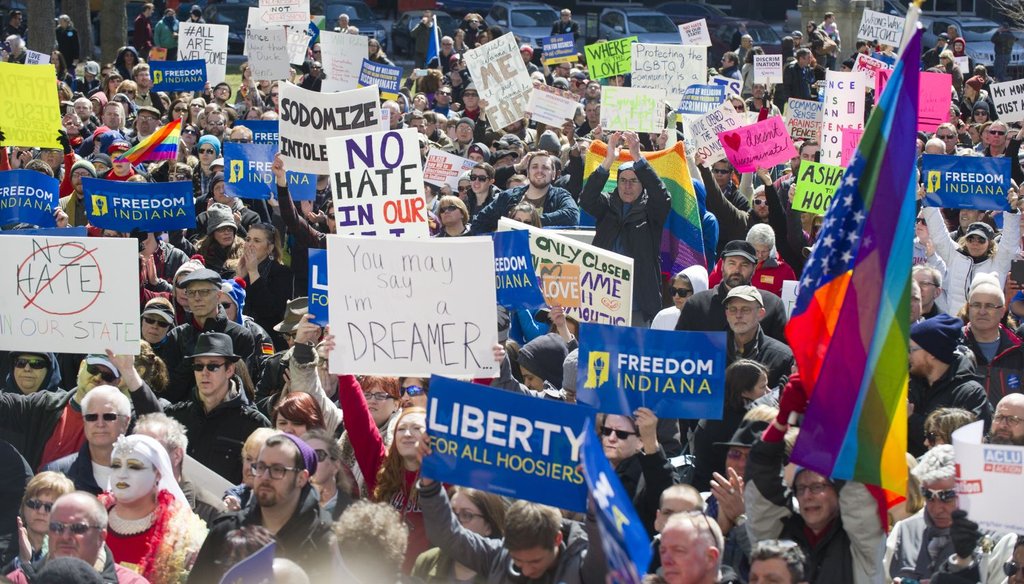Stand up for the facts!
Our only agenda is to publish the truth so you can be an informed participant in democracy.
We need your help.
I would like to contribute

Opponents of Indiana's Religious Freedom Restoration Act gathered on the lawn of the Indiana State House to rally on March 28, 2015. (AP Photo)
Does Florida have a Religious Freedom Restoration Act like Indiana's?
Likely presidential candidates have reacted to Indiana’s controversial Religious Freedom Restoration Act as Gov. Mike Pence, a Republican, has had to defend the law against those who say it discriminates against gays and lesbians.
Former Gov. Jeb Bush sided with Pence in a radio interview on Monday.
"I think Gov. Pence has done the right thing," Bush said in a radio interview with Hugh Hewitt on March 30. "Florida has a law like this. Bill Clinton signed a law like this at the federal level. This is simply allowing people of faith space to be able to express their beliefs, to be able to be people of conscience. I just think once the facts are established, people aren’t going to see this as discriminatory at all."
How similar is the Florida law to the Indiana law, or the federal law before that? When we reached out to Bush’s office, they reiterated that Bush was describing the laws as "very similar." We decided to delve into the evidence for a complete picture.
After federal law struck down, Florida’s law followed
Sign up for PolitiFact texts
Today’s controversy goes back to 1993, when Clinton signed into law the Religious Freedom Restoration Act. The law’s intent was to protect religious practices from government interference, such as whether a Muslim prison guard could wear a beard, or Native Americans could use peyote as part of the religious practices.
In 1997, the U.S. Supreme Court ruled that the law didn’t apply to states, which kicked off a spree of about 19 states passing their own versions of the law. In 1998, a year before Bush took office, the Florida Legislature passed the Florida Religious Freedom Restoration Act with broad support and little media attention. Both the American Civil Liberties Union and the Christian Coalition backed it. It became law without Democratic Gov. Lawton Chiles signature.
Florida’s law stated, "the government shall not substantially burden a person’s exercise of religion." To be clear, it made no mention of same-sex marriage or gay rights. (Neither does the Indiana law.)
At the time, state officials seemed most concerned about the protections they would have to provide prisoners.
"We had one prisoner who wanted conjugal visits because he said his religion commanded him to 'go forth and multiply,’ "' said Marty Moore, deputy general counsel for Florida Attorney General Bob Butterworth, to the Lakeland Ledger.
Over the years, churches and ministers have used the law to argue that they shouldn’t be subject to zoning laws or other actions from local government. They haven’t found much success due to "hostile judicial interpretation," said University of Virginia professor Douglas Laycock.
In one case, Temple B’Nai Zion in Sunny Isles Beach -- a city in Miami-Dade County -- used the Florida law to challenge a decision by the city to designate their 1964 building as historic. The temple’s owners said the designation would stifle expansion plans.
The lawsuit was dismissed by a Miami federal judge but reinstated by a federal appeals court. In 2014, the temple and the city reached a settlement that kept the historic designation but allowed some expansion.
Differences in text and context
In 2015, the context for Indiana’s law is different. Courts have been striking down same-sex marriage bans, including in Indiana, and the U.S. Supreme Court is expected to weigh in on the constitutionality of the bans this year.
When Pence signed Indiana’s law in a private ceremony, people who work for groups that oppose same-sex marriage were in attendance. One of the lobbyists, Eric Miller of Advance America, heralded the state’s law as protecting Christian bakers, florists and photographers from penalty "for refusing to participate in a homosexual marriage, among other examples."
In addition to that context, there are differences in the texts of Florida’s 1998 law and Indiana’s recent law.
Indiana’s law says the law can be used to protect religious freedom in private disputes, even if the government is not a party. Florida’s law has no such language.
Here’s the Indiana text:
"A person whose exercise of religion has been substantially burdened, or is likely to be substantially burdened, by a violation of this chapter may assert the violation or impending violation as a claim or defense in a judicial or administrative proceeding, regardless of whether the state or any other governmental entity is a party to the proceeding."
Featured Fact-check
Indiana’s law seems to be written to specifically cover a situation such as the New Mexico photographer who did not want to participate in a same-sex wedding, said Caroline Mala Corbin, a University of Miami constitutional law professor. The New Mexico Supreme Court ruled against the photographer.
Indiana’s law follows the Supreme Court case about Hobby Lobby, in which the court ruled that the federal law protects family owned corporations from being forced to offer insurance that covers contraception under the health care law.
Under Indiana’s law, a "person" is extended to mean "a partnership, a limited liability company, a corporation, a company, a firm, a society, a joint-stock company, an unincorporated association" or other entity.
"Unlike the federal and Florida RFRA (Religious Freedom Restoration Act), the Indiana one explicitly covers for-profit corporations," Corbin said. "It’s still an open question as to whether Florida’s RFRA extends to any for-profit corporation."
University of Minnesota law professor Dale Carpenter pointed to two more differences between the laws in Florida and Indiana:
• The Florida law specifically excludes claims made under the state's drug abuse prevention and control law (Chapter 893), which means you can’t get a religious exemption to drug laws in Florida. The Indiana law has no such limitation.
• The Florida law requires that a person's religious exercise must be burdened before a claim can be made. The Indiana law says that it need only to be "likely to be substantially burdened."
Robin Fretwell Wilson, professor and director of the family law and policy program at the University of Illinois College of Law, said Florida and Indiana share something in common: Neither has a statewide ban against LGBT discrimination.
Our ruling
Speaking of the Indiana law, Bush said that Florida "has a law like this."
Florida did pass its own version of the 1993 federal Religious Freedom Restoration Act. But the laws and the context for their passage are different.
Indiana’s law says government doesn’t have to be a party to the case, and it extends protections to corporations, and that’s different from Florida’s law.
Bush's statement is partially accurate but leaves out important details. We rate this claim Half True.
Our Sources
Hugh Hewitt, "Jeb Bush on the Indiana law, Iran and Hillary," March 30, 2015
Florida Archives, Florida Religious Freedom Restoration Act, 1998
National Conference of State Legislatures, "State Religious Freedom Restoration Acts," March 13, 2015
Letter from law professors to Indiana Senate Judiciary Committee, Feb. 3, 2015
Enrolled Indiana Senate Act 101, accessed March 29, 2015
Indiana Senate Republicans, "Protecting religious freedom," March 26, 2015
Chicago Tribune, "Illinois law on religious objection balanced by discrimination ban," March 27, 2015
Human Rights Campaign blog, "HRC to Governor Pence: No Phony "Clarifications" of S.B. 101," March 29, 2015
Session transcript from Illinois’ 90th General Assembly, March 13, 1998
Case Western Law Review article by Robin Fretwell Wilson, "Marriage of Necessity: Same-Sex Marriage and Religious Liberty Protections," spring 2014 (see table A2: State-Wide Sexual Orientation Nondiscrimination Measures)
National Conference of State Legislatures, States with Religious Freedom Restoration Acts and 2015 State Religious Freedom Restoration Act legislation, accessed March 29, 2015
Advance America, "Victory at the state house!" March 26, 2015
Statement from Lambda Legal, "Lambda Legal to Gov. Pence: Stop Deceiving the Nation on SB 101," March 29, 2015
Cornell law school, "Traditional Indian religious use of peyote," Accessed March 31, 2015
Florida statutes, 893, Accessed March 31, 2015
Florida statutes, Construction of statutes, Accessed March 31, 2015
Find law, "Temple B’Nai Zion Inc. vs. Sunny Isles Beach," Aug. 29, 2013
Associated Press, "Religion news in brief," Sept. 3, 2014
Lakeland Ledger, "Seeking protection for religion," April 12, 1998
Lakeland Ledger, "Florida religion law attracts diverse allies," June 23, 1998
Indy Star, "Gov. Mike Pence: Change RFRA law to make it clear discrimination won’t be allowed," March 31, 2015
In Advance, "The Indiana Religious Freedom Restoration Act -- an analysis of its controversy," March 27, 2015
Miami Herald, "Sunny Isles temple gets historic designation despite controversy," Dec. 6, 2010
Tampa Bay Times columnist Martin Dyckman, "The non-elected need not apply," June 4, 1998
Tampa Bay Times The Buzz., "Jeb Bush praises Indiana law under attack as anti-gay, pro discrimination,’" March 30, 2015
PolitiFact, "Did Barack Obama vote for Religious Freedom Restoration Act with ‘very same’ wording as Indiana?" March 29, 2015
Washington Post The Fact Checker, "Is the controversial Indiana law ‘the same’ as a law backed by Obama?" March 30, 2015
Politico, "Rick Scott: I’d veto Arizona SB 1062," Feb. 26, 2015
Interview, Caroline Mala Corbin, University of Miami law professor, March 31, 2015
Interview, Dale Carpenter, University of Minnesota law professor, March 31, 2015
Interview, Nadine Smith, director of Equality Florida, March 31, 2015
Interview, Keith Poliakoff, lawyer, March 31, 2015
Interview with Eunice Rho, American Civil Liberties Union counsel, March 29 and 31, 2015
Interview with Douglas Laycock, University of Virginia constitutional law, March 29 and 31, 2015
Interview with Robin Fretwell Wilson, University of Illinois College of Law professor of law and director of the family law and policy program, March 29 and 31, 2015
Browse the Truth-O-Meter
More by Katie Sanders
Does Florida have a Religious Freedom Restoration Act like Indiana's?
Support independent fact-checking.
Become a member!
In a world of wild talk and fake news, help us stand up for the facts.





















































